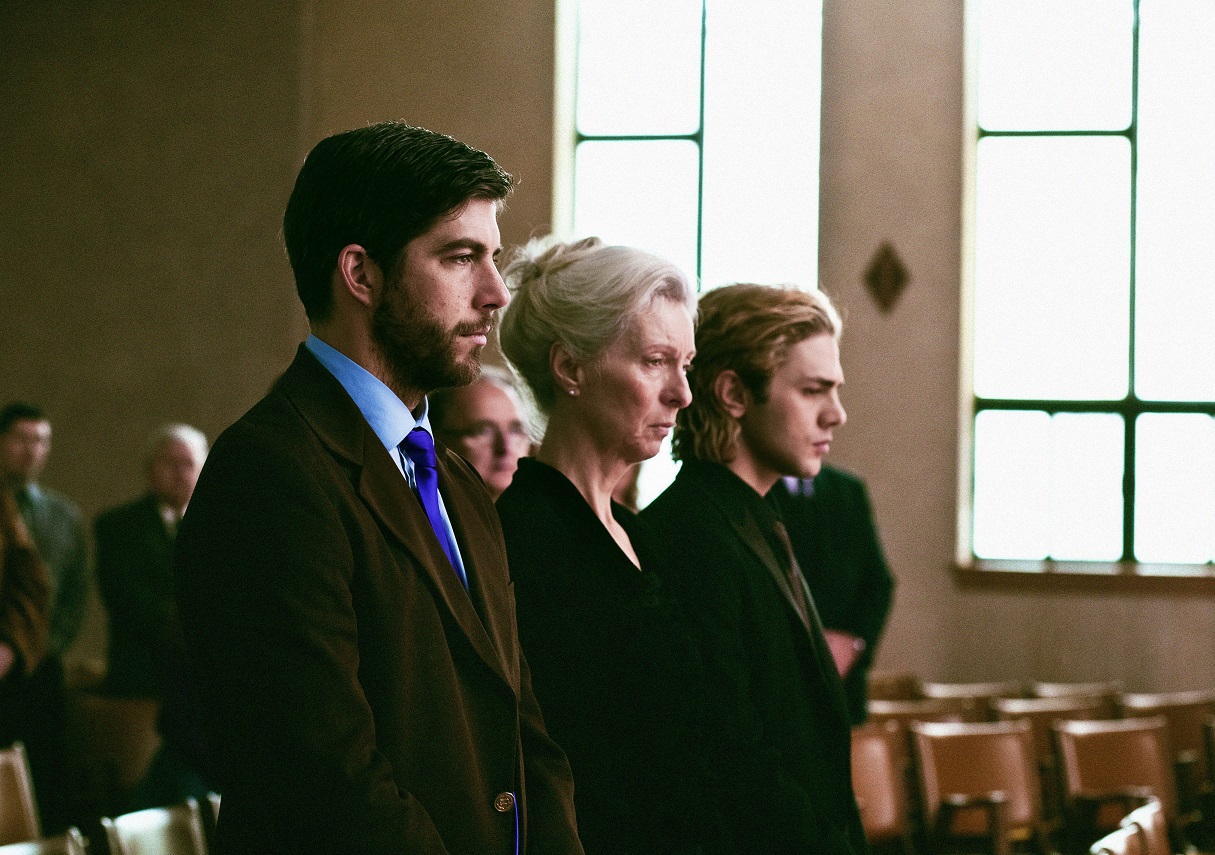Claustrophobia and a sense of huge space combine in Quebecois Xavier Dolan’s Tom at the Farm. It’s an adaptation of Michel Marc Bouchard’s stage play, and the former element must have worked particularly well in the theatre’s enclosed space. Transferring it to the screen Dolan has brought out an almost hypnotic enormity in the empty rural landscapes that act as counterpoint for this chamber drama with a main cast of just three, figures acting out a somehow perverse but chillingly convincing scenario of loss and deceit.
Dolan opens his French-language film () with a short formalized visual meditation on grief, before cutting to a birdseye view of enormous fields and skies, as his camera follows a single car driving along a road below. The director himself plays the titular character, and the first we see of his dishevelled blond appearance (main picture, above) convinces that he is riven by strong emotions. About what, and where he’s going, and for what reason will become clear only gradually.
its effect is strengthened enormously by a remarkable score from Gabriel Yared
Arriving at a lonely and deserted farmhouse, he chances on the keys, and lets himself in – it’s as if he has some claim on the place, even though he’s never seen it before. Dropping off to sleep from exhaustion, he’s woken by the arrival of a gaunt older woman, who seems surprised – but only mildly so – to find a stranger in her house. She is Agathe (Lise Roy), and 25-year-old Montreal copywriter Tom turns out to have been the partner of her late son Guillaume, to whose funeral he has come. As he becomes aware, Agathe knew nothing either of Guillaume’s sexuality, or his relationship with Tom, talking instead of a notional girlfriend, Sarah, and exact details of the latter’s character, even though it’s clear that it’s been years since Guillaume had been home, and never with a girlfriend.
It’s a lie that Tom chooses to go along with, both in confusion and out of sympathy for the mother’s evident heartbreak, but one which becomes far more threatening when he has his first encounter later that night with Guillaume’s elder brother Francis (Pierre-Yves Cardinal). For Francis violence remains a very tangible weapon in his insistence that Tom maintain the girlfriend deception that he, Francis, has so assiduously cultivated. Tom becomes gradually dominated, chased through the fields and brought back as he attempts to flee through the high crops.
 After the funeral (pictured right, Cardinal as Francis, left, with Roy as Agathe, and Dolan), Tom flunks another much more real chance to escape, and turns his car back to the farmhouse, where he becomes effectively a captive, though very much a consenting one, brought into a sort of reciprocal connivance. Dolan’s film stands or falls on whether this so uneasy, unexpected contact, between the aggressive, homophobic Francis and the rather fey Tom, stands up. Both reveal other parts of their personalities over time, and Tom, playing out and exaggerating the role that has been “assigned” to him in turn acquires his own power. Which he asserts when he persuades Sarah – a real friend of his and his late partner – to visit and perform something of the role that's been given to her. There, too, we discover some assumed certainties have their own complexities.
After the funeral (pictured right, Cardinal as Francis, left, with Roy as Agathe, and Dolan), Tom flunks another much more real chance to escape, and turns his car back to the farmhouse, where he becomes effectively a captive, though very much a consenting one, brought into a sort of reciprocal connivance. Dolan’s film stands or falls on whether this so uneasy, unexpected contact, between the aggressive, homophobic Francis and the rather fey Tom, stands up. Both reveal other parts of their personalities over time, and Tom, playing out and exaggerating the role that has been “assigned” to him in turn acquires his own power. Which he asserts when he persuades Sarah – a real friend of his and his late partner – to visit and perform something of the role that's been given to her. There, too, we discover some assumed certainties have their own complexities.
That makes for a scene the theatricality of which harks back to Tom…’s stage origins, and it’s followed by another episode of explication that errs in the same direction. But Dolan brings drama and action back into his film’s denouement. Its effect is strengthened enormously by a remarkable score from Gabriel Yared, which comes out of the very best film music traditions – Bernard Herrmann coming to mind especially – and underpins the hypnotic, uneasy emotions we see on screen with added extras of Hitchcockian tension. In his past work, like the rather meandering Laurence Anyways from two years ago, Dolan has often created his soundscapes himself from surrounding pop elements, and by his own admission had originally planned to proceed with his new film in a similar way, keeping wider scoring to a minimum. Yared’s involvement really does take Tom at the Farm to another level, while cinematographer Andre Turpin also draws unexpected richness out of the film’s bleakish exteriors. Memorable stuff.
Overleaf, watch the trailer for Tom at the Farm














Add comment